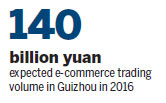
E-commerce centers expand options for rural residents, Song Mengxing and Zeng Jun report.
An e-commerce service center in the village of Qitan, Guizhou province, has attracted many visitors since it opened on Dec 18.
The center is run by Rural Taobao, a strategic project of e-commerce giant Alibaba Group to help people in rural areas buy and sell products online.
A display screen on the wall in the Qitan village center displays online commodities, ranging from items of daily use to home appliances.
"Eighteen packs of 200-piece tissues sell for 59.8 yuan ($9.17) online and 136 yuan in the supermarket," said a local villager surnamed Zhang.
Zhang said people in the village used to shop on market days and in supermarkets in the town, but would now think of the Rural Taobao center first. They can buy products online at the station and have them delivered to their homes, Zhang said.
A county-level Rural Taobao service center and 63 village-level centers, including the one in Qitan, started business in Yanhe Tujia autonomous county last year. By Feb 15, they had processed more than 28,000 transactions worth more than 3 million yuan.
Guizhou officials said developing e-commerce in rural areas is a measure the province in Southwest China is taking to promote its big data strategy.
Guizhou plans to implement the strategy during the 13th Five-Year Plan (2016-20) period to spur economic development and improve people's lives, they said.
Luo Yingping, deputy general manager of Alibaba in Guizhou, said Rural Taobao has helped people in Yanhe, which abounds in natural resources, sell more than 100 varieties of product online and nurtured 11 e-commerce businesses in the county.
Guizhou officials said Guizhou would speed up improvement of its rural e-commerce support system, which includes professionals, logistics and policies, and efficiently use the province's advantages of specialty resources and the big data industry to promote rural e-commerce.
E-commerce trading volume in the province is expected to reach 140 billion yuan in 2016. Guizhou plans to have more than 50 provincial-level e-commerce model counties, more than 1,000 e-commerce service centers in towns and townships and more than 10,000 village-level centers by the end of 2017.
The big data industry has been a focus in Guizhou in recent years. A big data exchange began operation on April 14, 2015, the first of its kind in China, and carried out China's first local regulation of big data on March 1, 2016.
Telecom companies China Mobile, China Telecom and China Unicom decided in 2013 to set up data centers in Guizhou, with total investment of 15 billion yuan and more than 2 million servers, said Kang Keyan, director of the office for big data industry development in Guizhou.
The province is also storing data for some government agencies, including the China National Tourism Administration.
The Guizhou government and United States chipmaker Qualcomm set up a semiconductor company focusing on the design, development and marketing of server chips used in China in January.
Initial registered capital of the joint venture is 1.85 billion yuan and it is based in the Guian New Area of Guizhou.
Derek Aberle, president of Qualcomm, said Guizhou is a crucial strategic center for China to develop technologies of data centers and the partnership is a great win-win opportunity for Qualcomm and Guizhou to seize China's huge market for data center technologies.
He said that cooperating with Guizhou is a very important step as Qualcomm furthers its cooperation in China and continues to increase investment in the country.

Qualcomm will also license its proprietary server technologies to the joint venture and provide research and development support, Aberle said.
Sun Ninghui, director of the Institute of Computing Technology at the Chinese Academy of Sciences, said data centers would be a market of huge potential and need many server chips.
Through the joint venture, he said, Guizhou will "get its high-end chip sector support to develop the big data industry" and reduce the cost of developing big data infrastructure.
Xu Shaoshi, head of the National Development and Reform Commission, said the commission would continue to support cooperative projects like the one between Qualcomm and Guizhou and welcomes companies across the world to invest in China, especially in the vast western region.
Guian New Area, a key region in Guizhou for developing the big data industry, had attracted more than 300 companies in the big data and related sectors by the end of 2015.
It aims to make the value of big data-related output reach 150 billion yuan and attract 800 big data companies by the end of 2020, the area's website said.
Guiyang, the capital city of Guizhou, will hold the 2016 Big Data Expo in late May to showcase new products, technologies and models related to global big data development and attract insiders to discuss crucial problems and development trends.
Contact the writers at songmengxing@chinadaily.com.cn and zengjun@chinadaily.com.cn
|
The picturesque Jiangkou county in Guizhou province. The region in southwestern China is rich in natural resources and has a history of developing high-tech industries |
|
A call center for a big data firm in Guiyang, capital of Guizhou province. Photos Provided To China Daily |
|
A trading center for big data in Guiyang. Yang Jun / China Daily |